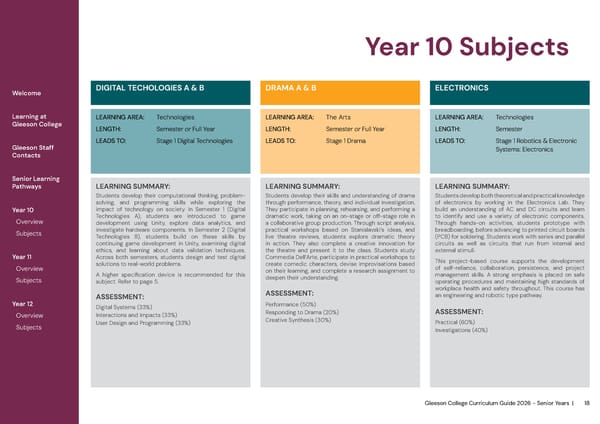Gleeson College Curriculum Guide 2026 - Senior Years | 18 Year 10 Subjects Welcome Learning at Gleeson College Gleeson Staff Contacts Senior Learning Pathways Year 10 Overview Subjects Year 11 Overview Subjects Year 12 Overview Subjects DIGITAL TECHOLOGIES A & B LEARNING AREA: Technologies LENGTH: Semester or Full Year LEADS TO: Stage 1 Digital Technologies LEARNING SUMMARY: Students develop their computational thinking, problem- solving, and programming skills while exploring the impact of technology on society. In Semester 1 (Digital Technologies A), students are introduced to game development using Unity, explore data analytics, and investigate hardware components. In Semester 2 (Digital Technologies B), students build on these skills by continuing game development in Unity, examining digital ethics, and learning about data validation techniques. Across both semesters, students design and test digital solutions to real-world problems. A higher specification device is recommended for this subject. Refer to page 5. ASSESSMENT: Digital Systems (33%) Interactions and Impacts (33%) User Design and Programming (33%) DRAMA A & B LEARNING AREA: The Arts LENGTH: Semester or Full Year LEADS TO: Stage 1 Drama LEARNING SUMMARY: Students develop their skills and understanding of drama through performance, theory, and individual investigation. They participate in planning, rehearsing, and performing a dramatic work, taking on an on-stage or off-stage role in a collaborative group production. Through script analysis, practical workshops based on Stanislavski’s ideas, and live theatre reviews, students explore dramatic theory in action. They also complete a creative innovation for the theatre and present it to the class. Students study Commedia Dell’Arte, participate in practical workshops to create comedic characters, devise improvisations based on their learning, and complete a research assignment to deepen their understanding. ASSESSMENT: Performance (50%) Responding to Drama (20%) Creative Synthesis (30%) LEARNING SUMMARY: Students develop both theoretical and practical knowledge of electronics by working in the Electronics Lab. They build an understanding of AC and DC circuits and learn to identify and use a variety of electronic components. Through hands-on activities, students prototype with breadboarding, before advancing to printed circuit boards (PCB) for soldering. Students work with series and parallel circuits as well as circuits that run from internal and external stimuli. This project-based course supports the development of self-reliance, collaboration, persistence, and project management skills. A strong emphasis is placed on safe operating procedures and maintaining high standards of workplace health and safety throughout. This course has an engineering and robotic type pathway. ASSESSMENT: Practical (60%) Investigations (40%) ELECTRONICS LEARNING AREA: Technologies LENGTH: Semester LEADS TO: Stage 1 Robotics & Electronic Systems: Electronics
 2026 Gleeson College Senior Years Curriculum Guide 2026 Page 17 Page 19
2026 Gleeson College Senior Years Curriculum Guide 2026 Page 17 Page 19